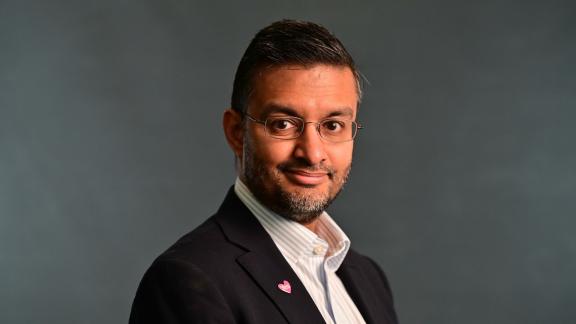We must act together to save lives

Organ donation transforms lives, but there can't be a transplant without a donor. Collaboration across the NHS is key to raising the awareness that will lead to increasing organ donors and saving more lives.
The gift of life is one of the greatest gifts we can give, and for me it is one of the most amazing things we do for our patients in the NHS. But there cannot be a transplant without a donor.
Organ donation is an act of compassion that transforms lives. A single donor can save or improve up to nine lives, yet consent rates are falling and patients die every day while waiting for a transplant.
Health inequalities also play a role. People from ethnic minority backgrounds are less likely to consent to donation but twice as likely to need a transplant, leading to longer waits and higher risks.
A personal story
In 2004, my wife died suddenly of a brain haemorrhage at just 32. She had always carried a donor card and, importantly, she told me she wanted to donate. At Bradford Royal Infirmary, I was asked the question no husband ever wants to hear, but I said yes to organ donation because I knew what she wanted. Because of that decision, four people received the gift of life - including a boy of 18 months who only survived because of the transplant of part of her liver.
"Losing my wife was devastating, but I have always been proud of her legacy"
In May 2025, 21 years later, I met that boy - now in his early 20s - with his family. It was an emotional reminder of how donation changes lives far beyond the moment of loss.
Losing my wife was devastating, but I have always been proud of her legacy. The compassionate care that I saw and received also inspired me to give back and has changed my life too. I’m passionate about raising awareness of organ donation and encouraging collaboration with NHS Blood and Transplant (NHSBT) on this vitally important issue.
I’ve served as an organ donation ambassador, joined organ donation committees in West Yorkshire, and later became a non-executive director at Mid Yorkshire Teaching NHS Trust. I now chair Chesterfield Royal Hospital NHS FT, and from October 2025, I will chair Sheffield Teaching Hospitals NHS FT - a transplanting hospital trust that will be very meaningful for me.
Collaboration is key
Collaboration is key to raising the awareness that will lead to increasing the numbers of organ donors. Every acute trust has an organ donation committee (ODC), which has two central aims: to ensure good quality processes for organ donation and transplantation within the hospital environment, and to promote organ donation awareness amongst communities that it serves. As NHS leaders, supporting them is one of the most effective ways to raise awareness. The chairs of the ODCs, specialist nurses for organ donation, clinical leads for organ donation and NHSBT ambassadors (donor families, recipients, and others with lived experience) play essential roles in this work, as do hospital chaplains who, where possible, should be linked in with their ODCs to help families make decisions.
"Inequalities in ethnicity and deprivation affect those who most need and receive transplants and who consent to donation"
But this is not only an acute trust issue. Inequalities in ethnicity and deprivation affect those who most need and receive transplants and who consent to donation. Tackling these disparities means working closely with health inequalities teams at primary care, provider and ICB level, and with organisations such as NHSBT, Kidney Care UK and campaigns such as South Asian Heritage Month.
A simple call to action
Across the country, from 22 to 28 September, many public buildings including hospitals will light up pink to recognise Organ Donation Week. NHSBT also provides resources and social media campaigns that trusts and ICBs can use to amplify messages.
My message is simple: On a personal level, make an informed decision about organ donation, tell your loved ones and record your choice on the Organ Donor Register.
On an organisational level, reach out and collaborate with your organ donation committees, ICBs and national organisations like NHSBT to help raise awareness in your area.
Organ Donation Week gives us a platform to break down barriers by encouraging conversations in families, schools, communities and across the NHS.
The NHS is a family of organisations and when we work hand in hand with NHSBT, we turn Organ Donation Week from a campaign into a movement.
Mahmud Nawaz is chair of Chesterfield Royal Hospital NHS Foundation Trust; chair designate (from 1 Oct 2025) of Sheffield Teaching Hospitals NHS Foundation Trust and an ambassador for NHS Blood and Transplant. You can connect with Mahmud on LinkedIn.



